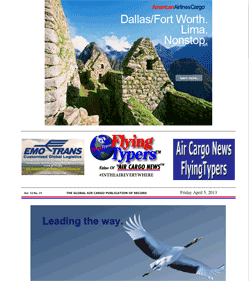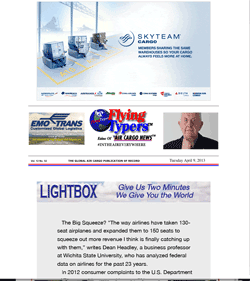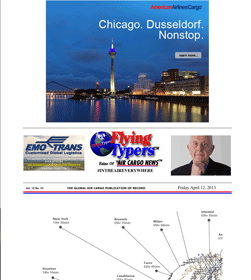
Recently
there has been much talk about
the threat to our industry from
integrators and other modes
of transport.
Sorry
to say, but the subject is as
old as the hills in terms of
being an issue confronting air
cargo.
In
fact, there most likely is a
microfiche file at some local
library that contains an issue
of our old Air Cargo News from
1978, featuring people like
Buz Whalen, the cargo boss at
JAL Cargo USA, industry chieftains
such as Luis de la Reguera at
Iberia, Fernando Tavera at VIASA,
Norm Jeppeson at BOAC, and a
few others from TWA and Pan
Am Clipper Cargo, sitting around
a table at the old Wings Club
in Manhattan’s Biltmore
Hotel, under the watchful eye
of Amelia Earhart, talking for
hours about just these things.
Patrick
Murray, Head of Dubai-based
Calogi, is one of the smartest
guys we’ve met in air
cargo.
Patrick
can be seen at upcoming trade
show sessions in 2013, which
become a lot less like a dog
and pony exercise when guys
and gals like him are on the
panel.
This
time, the table talk is about
the impending disappearance
of air cargo as we know it,
or knew it, before we blew it.
  Will air cargo slowly
disappear under its own weight?
Will air cargo slowly
disappear under its own weight?
 Today industry leaders
agree: we need to do something
as other modes of transport
threaten to take over bigger
portions of the traditional
air cargo business.
Today industry leaders
agree: we need to do something
as other modes of transport
threaten to take over bigger
portions of the traditional
air cargo business.
Our
industry is full of brilliant
people, so it is surprising
that some of our processes are
based on practices dating back
to the 1960s.
Looking
back over the last few decades,
there have been thousands of
innovations that have changed
our lives forever. Smartphones
and the Internet are two that
come to mind immediately, but
there are other advances that
are worthy of mention.
 But there are plenty
of other examples where innovation
met inventiveness and determination,
and actual need brought about
change.
But there are plenty
of other examples where innovation
met inventiveness and determination,
and actual need brought about
change.
 Sure. In 1961 General
Motors introduced the first
industrial robot to assist workers
with the production of cars.
Sure. In 1961 General
Motors introduced the first
industrial robot to assist workers
with the production of cars.
In
1971 The Society for Worldwide
Interbank Financial Telecommunication
(SWIFT) started the process
of creating a shared, worldwide
data processing and communications
links and common language for
international financial transactions.
 What about in 1976,
when United Airlines offered
its Apollo system to travel
agents, leading to the development
of SABRE, PARS, and DATAS, allowing
travel agents to do online business
with airlines, hotels, and other
tourism institutions?
What about in 1976,
when United Airlines offered
its Apollo system to travel
agents, leading to the development
of SABRE, PARS, and DATAS, allowing
travel agents to do online business
with airlines, hotels, and other
tourism institutions?
 Innovation can come
at peculiar times and places
as well. An example of that
how is in 1979, when Gene Mosher’s
Old Canal Café in Syracuse,
New York, began using point-of-sale
software to take customer orders;
it sent information to the kitchen
and monitor (in real-time),
effecting labor and food costs.
Innovation can come
at peculiar times and places
as well. An example of that
how is in 1979, when Gene Mosher’s
Old Canal Café in Syracuse,
New York, began using point-of-sale
software to take customer orders;
it sent information to the kitchen
and monitor (in real-time),
effecting labor and food costs.
These
innovations advanced each industry
and helped usher in new eras
of productivity.
 How
would you compare air cargo
to the aforementioned? How
would you compare air cargo
to the aforementioned?
 Cargo has yet to
adopt innovations like these
and while it is not a like-for-like
comparison, if we compare and
contrast our industry to the
above, we find the following:
Cargo has yet to
adopt innovations like these
and while it is not a like-for-like
comparison, if we compare and
contrast our industry to the
above, we find the following:
The
majority of air cargo ULDS are
loaded by manual means—forklift
or by hand.
Many
air cargo supply chain stakeholders
are not connected to networks,
which allow them to exchange
industry messages with business
partners.
Cargo
is still lacking a widely adopted
global distribution system.
The
telephone is still the main
instrument for negotiating air
cargo rates and bookings.
There
is no doubt we have the ideas
and that many air cargo stakeholders
do invest when it comes to their
air cargo systems.
 But do we invest
enough? Cargo contributes between
15-18 percent to the bottom
line, so for every 100 million
USD invested by an airline in
their product lines, do we see
15-18 million coming to the
cargo business?
But do we invest
enough? Cargo contributes between
15-18 percent to the bottom
line, so for every 100 million
USD invested by an airline in
their product lines, do we see
15-18 million coming to the
cargo business?
We suspect not.
 There has been one
resounding message: the traditional
air-cargo supply chain needs
to give customers what they
want.
There has been one
resounding message: the traditional
air-cargo supply chain needs
to give customers what they
want.
 How
many air cargo industry solutions
are designed to make it easy
to do business with their customers
rather than managing internal
processes? How
many air cargo industry solutions
are designed to make it easy
to do business with their customers
rather than managing internal
processes?
 Not many.
Not many.
 And
what about the integrators? And
what about the integrators?
 With integrators,
the customer is able to do everything
online and knows the goods will
be delivered to the consignee
within a specified time frame.
With integrators,
the customer is able to do everything
online and knows the goods will
be delivered to the consignee
within a specified time frame.
 The
customer neither knows nor cares
how the deliveries get there,
they pay up-front with the understanding
that the service will be delivered. The
customer neither knows nor cares
how the deliveries get there,
they pay up-front with the understanding
that the service will be delivered.
 Yes, and that costs
more, but peace of mind, if
the integrators’ success
is any measure, is a price-point
worth paying for.
Yes, and that costs
more, but peace of mind, if
the integrators’ success
is any measure, is a price-point
worth paying for.
 Integrators
have managed to turn the wholesale
business of air cargo into a
retail business. What can we
learn from this approach? Integrators
have managed to turn the wholesale
business of air cargo into a
retail business. What can we
learn from this approach?
 I’m not suggesting
everyone develop a solution
which competes with the integrators,
but the combination air cargo
business should move e-business
forward and must no longer accept
the status quo, which is holding
our industry back.
I’m not suggesting
everyone develop a solution
which competes with the integrators,
but the combination air cargo
business should move e-business
forward and must no longer accept
the status quo, which is holding
our industry back.
 So
even though some parts of the
air cargo industry are in survival
mode, what do you suggest to
ensure business continuity in
2013? So
even though some parts of the
air cargo industry are in survival
mode, what do you suggest to
ensure business continuity in
2013?
 First reduce the
use of mail, telephone, and
fax. These are outdated and,
in the case of telephone and
fax, expensive methods of communication.
First reduce the
use of mail, telephone, and
fax. These are outdated and,
in the case of telephone and
fax, expensive methods of communication.
Develop
a plan to migrate to an online
solution. There are plenty of
inexpensive solutions available.
Also, airlines and forwarders
must exploit existing e-Cargo
capabilities:
Implement
programs to roll out electronic
availability requests and responses,
electronic booking requests
and responses, electronic air
waybills rating and electronic
status updates.
Make
it easy to do business.
Embrace
the e-AWB: Designate a project
manager to implement the e-AWB
on all available routes where
it is feasible.
Look
at reducing data entry tasks
to an absolute minimum.
 So
utilizing solutions such as
Calogi (dare we suggest) can
provide an avenue toward this
solution? So
utilizing solutions such as
Calogi (dare we suggest) can
provide an avenue toward this
solution?
 It should only be
that simple—but yes, Calogi
can help.
It should only be
that simple—but yes, Calogi
can help.
The
rest starts with, for example,
companies incentivizing their
trading partners to do electronic
business.
Air
cargo needs to utilize information
gathered effectively: look at
how to develop real-time reports.
Identifying
the trends and reacting early
to changes can help better manage
a business and to address risks
before they become issues. We
need to make better use of human
capital. Implementing the previous
steps will free up staff time.
Use your team to develop campaigns
and conduct face-to-face sales
meetings with clients to promote
your products and build relationships.
 What
about that IATA campaign underscoring
the importance of air cargo,
and “Air Cargo Makes It
Happen” focusing on the
value of air cargo? What
about that IATA campaign underscoring
the importance of air cargo,
and “Air Cargo Makes It
Happen” focusing on the
value of air cargo?
Air
cargo transports over US$6.4
trillion worth of goods, or
approximately 35 percent of
world trade by value.
 The IATA campaign
is a good idea worthy of industry-wide
attention. Air cargo is a trade
facilitator that contributes
to the global economic development.
It is up to each of member of
the industry to share that message.
I believe we are at the beginning
of air cargo’s version
of the industrial revolution
and we cannot falter. We have
a duty to make this happen before
it is too late.
The IATA campaign
is a good idea worthy of industry-wide
attention. Air cargo is a trade
facilitator that contributes
to the global economic development.
It is up to each of member of
the industry to share that message.
I believe we are at the beginning
of air cargo’s version
of the industrial revolution
and we cannot falter. We have
a duty to make this happen before
it is too late.

December 8, 1980—Seated
under a photograph of Amelia
Earhart, at the Wings Club,
in the old Biltmore Hotel
in New York City—the
first Air Cargo News Roundtable
discussed industry issues.
(Left to right) are Luis
de la Reguera, Iberia; Fernando
Tavera, Viasa; Eugene ‘Buz’
Whalen, Japan Airlines;
Norman Jeppeson, British
Airways; Richard Haberly,
Flying Tigers; Geoffrey
Arend, Air Cargo News; Dick
Logan, Air Cargo News; William
Clarke, TWA; and Peter Diefenbach,
Pan Am. |
A postscript: Nice going
Patrick!
He’s
a smart guy in an industry that
must figure out a way to stay
in business so as not to end
up on some has-been junk heap.
Sometimes
I think about that first air
cargo industry roundtable and
wonder about those great folks
that were there 35 years ago
in 1978.
Buz
Whalen is in Florida and I have
seen Isaac and also Fernando
recently, I think, or maybe
it was in a dream.
The
picture of Amelia was created
by artist James Mongomery Flagg,
the man who created the immortal
and iconic WWI recruiting poster
for the U.S. Army: Uncle Sam
pointing his finger and saying
“I Want You.”
Today
the Wings Club shares a home
with The Yale Club in New York
City, where it holds monthly
meetings with big name speakers.
Maybe
Flagg’s Amelia is on a
wall somewhere at The Yale Club.
Wherever
she is, wherever those guys
who once met in the Biltmore
are today, we are quite sure
that this conversation must
bring a smile as time marches
on.
Geoffrey |


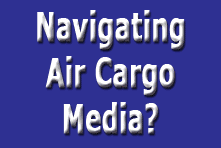

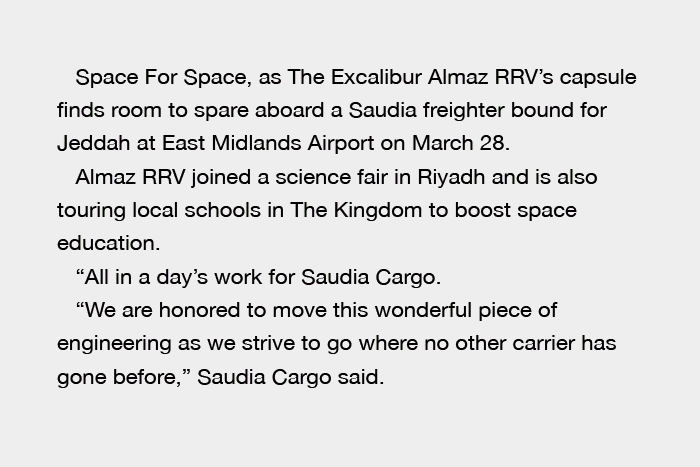






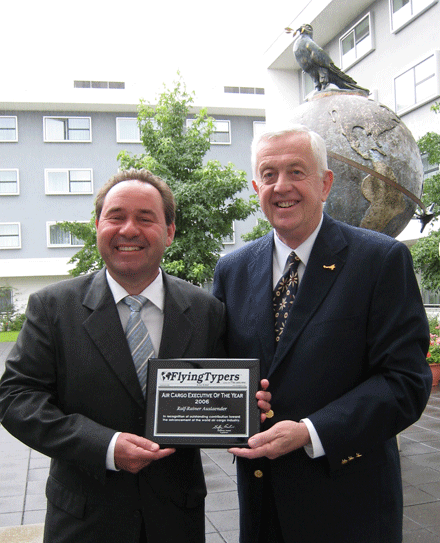 Awards?
Sure we do! But as the story
below underscores, FT spells
out the reasons we find excellence
all around in air cargo.
Awards?
Sure we do! But as the story
below underscores, FT spells
out the reasons we find excellence
all around in air cargo. RE:
RE:
